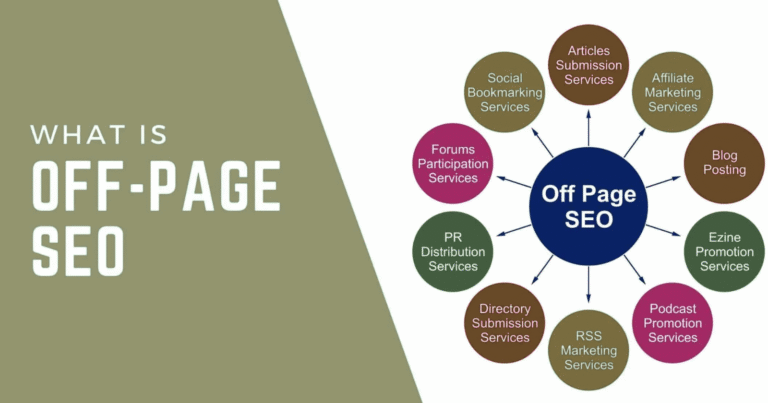When we think about SEO, we often focus on optimizing the website itself—content, keywords, meta tags. But there’s an entire world of SEO that happens outside your website, and it’s just as important.
That’s where Off-Page SEO comes in.
In this blog, we’ll dive deep into what Off-Page SEO is, why it matters, and how you can build strong strategies to improve your website’s authority and rank higher in search engines.
What is Off-Page SEO?
Off-Page SEO refers to all the activities you do outside your own website to improve its search engine rankings.
It focuses on building your site’s reputation, credibility, and trustworthiness through external sources.
In simple words, Off-Page SEO tells search engines that your website is valuable, reliable, and deserves a higher ranking.
Why is Off-Page SEO Important?
No matter how great your content is, if other websites don’t trust or recommend you, it’s hard to rank high.
Off-Page SEO builds that trust and authority.
Key reasons why Off-Page SEO matters:
- Increases Website Authority: The more quality backlinks you earn, the more credible your site appears to search engines.
- Boosts Rankings: Off-Page efforts are major ranking factors for Google.
- Drives Referral Traffic: Backlinks from popular sites can bring new visitors.
- Builds Trust: Mentions, shares, and recommendations from reputable sources enhance your brand’s reputation.
In short, Off-Page SEO is about earning respect on the internet.
Key Techniques of Off-Page SEO
Let’s break down the top strategies you should focus on for Off-Page SEO:
1. Link Building (Backlinks)
The heart of Off-Page SEO is link building — getting other websites to link back to your site.
Types of backlinks:
- Natural Links: Earned naturally without any effort. (e.g., someone finds your article valuable and links to it.)
- Manual Links: Earned through deliberate link-building activities (like outreach).
- Self-Created Links: Created by listing your site in directories, forums, comments, etc.
Key to success:
- Focus on high-quality, relevant backlinks.
- Avoid shady, spammy backlinks — they can harm your rankings.
2. Social Media Engagement
Social media signals indirectly impact SEO.
Sharing your content on platforms like Facebook, Instagram, LinkedIn, and Twitter helps in:
- Increasing brand exposure
- Driving traffic to your website
- Getting more shares and backlinks naturally
Although social signals are not a direct ranking factor, they amplify your Off-Page SEO efforts.
3. Influencer Outreach
Collaborate with influencers or industry leaders to promote your content, products, or services.
- Influencers can bring credibility.
- Their audience trusts their recommendations.
- It often results in high-quality backlinks and brand awareness.
4. Guest Blogging
Writing blog posts for other websites in your industry is a powerful way to:
- Build authority
- Get backlinks
- Reach new audiences
Make sure to choose reputable websites and create high-quality, valuable content.
5. Brand Mentions
Even without links, brand mentions across the internet matter.
- Google recognizes mentions of your brand name as a sign of authority.
- Positive mentions improve your online reputation.
Tools like Google Alerts can help you track your brand mentions.
6. Forum Posting
Participating in relevant forums and discussions can boost your visibility.
- Answer questions, provide value, and mention your website when appropriate.
- Focus on niche forums related to your industry.
Be helpful — don’t spam!
7. Content Marketing
Off-Page content marketing includes activities like:
- Publishing eBooks
- Creating infographics
- Hosting webinars
- Launching podcasts
Content outside your website can drive traffic back to you and strengthen your SEO presence.
8. Local SEO and Citations
For businesses targeting local audiences:
- List your business in local directories (Google My Business, Yelp, etc.)
- Ensure NAP (Name, Address, Phone Number) consistency.
- Get reviews from local customers.
Local citations and reviews can significantly impact your local search rankings.
How to Build a Strong Off-Page SEO Strategy
Here’s a simple plan:
- Create Shareable Content: Focus on valuable, engaging content.
- Reach Out: Build relationships with bloggers, journalists, and influencers.
- Earn Backlinks: Prioritize getting links from high-authority, relevant sites.
- Be Active on Social Media: Share content regularly and interact with followers.
- Monitor Your Online Reputation: Respond to reviews and feedback.
- Analyze and Improve: Use tools like Ahrefs, SEMrush, or Moz to track your Off-Page efforts.
Off-Page SEO is not a one-time task. It’s an ongoing process that requires consistency.
Common Off-Page SEO Mistakes to Avoid
Even with good intentions, mistakes can happen. Avoid these common pitfalls:
- Buying backlinks (violates Google’s guidelines)
- Using low-quality, spammy directories
- Overdoing anchor texts (unnatural linking)
- Ignoring nofollow links (they still have value)
- Neglecting online reputation management
A clean, ethical Off-Page strategy builds lasting success.
Final Thoughts: Why Off-Page SEO Matters
Off-Page SEO is like building a network of trust and authority around your website.
It tells search engines and users that your site is valuable, credible, and worth visiting.
While On-Page SEO ensures your house is beautiful and functional, Off-Page SEO invites people over and tells the world it’s the best house on the street.
By focusing on quality link building, meaningful social engagement, brand promotion, and smart collaborations, you can dramatically improve your website’s visibility and achieve long-term success.
Start small, stay consistent, and watch your rankings grow!







